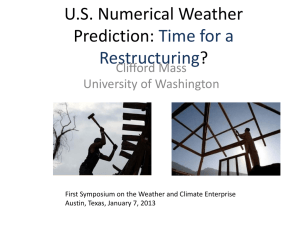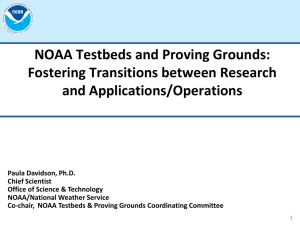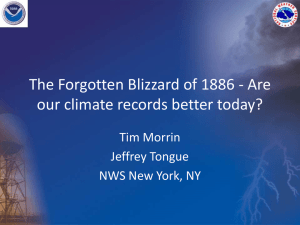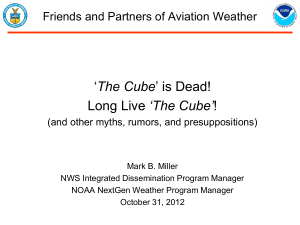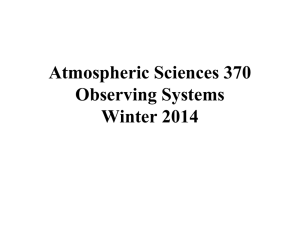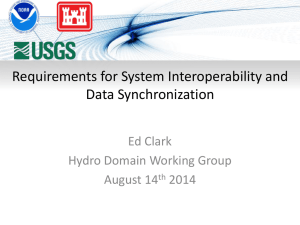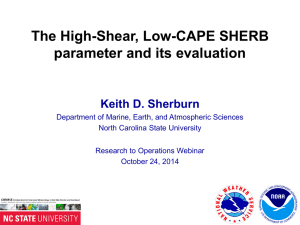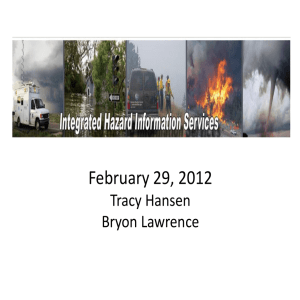File
advertisement
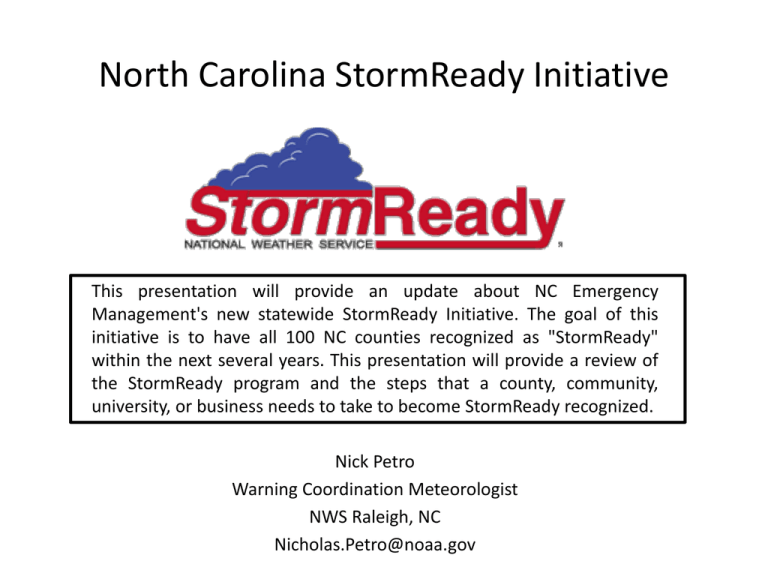
North Carolina StormReady Initiative This presentation will provide an update about NC Emergency Management's new statewide StormReady Initiative. The goal of this initiative is to have all 100 NC counties recognized as "StormReady" within the next several years. This presentation will provide a review of the StormReady program and the steps that a county, community, university, or business needs to take to become StormReady recognized. Nick Petro Warning Coordination Meteorologist NWS Raleigh, NC Nicholas.Petro@noaa.gov What are StormReady and TsunamiReady? Grassroots programs that: • Improve communication and preparedness • Provide guidance for preparedness programs • Strengthen local safety programs • Prepare communities for hazards 2 StormReady History • Began in 1999 in Tulsa, Oklahoma • Focused on education about storm safety • Implemented a planning system for severe weather 3 TsunamiReady History • Began in 2001 • Extrapolation of StormReady • Implemented a planning system for tsunamis 4 Incentives • • • • Improve warning timeliness and dissemination Justify program costs Provide “Image Incentive” for the community Lower National Flood Insurance Plan premiums 5 How Being StormReady Saves Lives Photo Credit: The ArkLaMiss Observer, Spring 2008 Edition, NOAA/NWS 6 How Does a Community Become StormReady or TsunamiReady? 7 Recognition Requirements • • • • • Establish 24-hour warning point and EOC Receive and disseminate warnings in several ways Monitor weather conditions locally Promote public readiness Develop hazardous plan 8 Recognition • • • • • Community contacts local NWS State Board reviews application State Board conducts onsite visit Community makes needed improvements Recognition ceremony is held Local Local 9 What Recognized Communities Receive • • • • • 3-year recognition from NWS Official signs Authorized use of logo Listing on national website Possible NFIP rate adjustments 10 Maintaining StormReady or TsunamiReady Recognition 11 Renewal Process After 3 Years • • • NWS Warning Coordination Meteorologist contacts the EM Recognition criteria are confirmed as still being met, and officials want to renew Recognition is renewed for 3 years 12 Renewal Process After 6 Years • • • • • Board sends 6-months advanced notice to re-apply Officials review original application and current information Officials update application State Board verifies continued compliance Recognition is renewed for another 3 years 13 Van Wert County, Ohio 14 Roanoke, Illinois 15 The Goal All 100 North Carolina Counties Recognized as StormReady A Closer Look at the Process 19 Step 1 Visit the StormReady web site http://www.nws.noaa.gov/stormready Step 2 Contact your local WCM http://www.nws.noaa.gov/stormready Step 3 Fill out the application and email your hazardous weather plan The Application Step 4 Visit your local NWS office Step 5 NWS Site Visit If criteria are not met, the NWS/Board suggests improvements and works with the community to implement necessary changes. Step 6 Once criteria are met a recognition ceremony is held for the community. Additional points • NOAA Weather Radio is a baseline requirement • Make sure your staff is aware of what StormReady is! (this is a nobrainer, right!?) • Every NWS StormReady board is slightly different, so expect some minor differences in the minor points of the program across NWS borders • Expect the process to take more time than you think it should • Be cognizant of the warning process on your end, and how you can save time to get the warning out to your community and responders. • Don’t forget about potential weather impacts in all events and incidents. • This is not a “certification” process. Rather, the program is designed to help provide guidelines and advice to help communities better prepare for, respond to, and deal with hazardous weather events of all types. • The community outreach and education portion of the program should not be underestimated. Q&A • How Will Becoming StormReady Benefit My Community? When your major roads display StormReady signs, residents, business owners and visitors know you are committed to safety and preparedness. StormReady tells the community that their emergency management staff takes safety seriously. • How long will it Take? There is no set time frame for becoming StormReady. Once you have submitted your application, the local board will review it, arrange a visit, notify you of any deficiencies or approve your office and recommend that your community be recognized. The process can take anywhere from a few weeks to several months. • What Does the Program Cost? There is no cost to apply to the StormReady Program. You may need to upgrade your emergency preparedness operation to meet StormReady criteria. Established Emergency Management programs may incur little or no additional expense. • Can I hire a service provider from America's Weather Industry to meet any of the StormReady guidelines? Absolutely. You may use data and services provided by America's Weather Industry to meet the StormReady guidelines. The NWS is concerned that you are prepared for hazardous weather and is willing to interact with your service provider in the same way that we would interact with you. Your service provider may also want to talk to us about availability of local weather information to meet your needs. Q&A • What is the difference between StormReady and FEMA's Pre-Disaster Mitigation Program? StormReady is a volunteer program which is separate from FEMA's Pre-Disaster Mitigation Program. However, the two programs complement each other by focusing on communication, mitigation, and community preparedness to save lives. • Is StormReady a grant program? No. There is no grant money associated with being recognized as "StormReady". However, the Insurance Services Organization (ISO) may provide Community Ratings System (CRS) points to StormReady communities, which may be applied toward lowering NFIP flood insurance rates. • Will it cost my community anything? Any investment by the community will depend on current assets. Established Emergency Management programs may incur little additional expense, while others may require more of an investment. There greatest costs involved may be with upgrading a community’s reception and dissemination infrastructure to meet established StormReady guidelines. Q&A • Is other funding (beside the NWS) available to help us become/ improve our StormReady program? (i.e., government/ private sector?) There are no direct funds available from the NWS. However, other government and/or private sector partners may work with your community to obtain funds that will help you meet StormReady guidelines. • Why is the NWS requiring me to do this? StormReady is a voluntary program, so we are not requiring this. But we think it is worth our investment if we can save lives. The NWS recognizes those communities that are better prepared for weather emergencies. • I saw the StormReady guidelines on the national web site. Why does my local NWS Office have different guidelines? National StormReady guidelines were designed to establish the minimum requirements for the program. However, many areas of the country have very specific weatherrelated needs which local NWS Offices consider during weather emergency planning with emergency management and community officials. As a result, StormReady allows the creation of Local StormReady Advisory Boards that have the flexibility to create specific by-laws for their area. Local Boards can also modify National StormReady guidelines to meet their specific customer needs. Q&A • What constitutes a community? StormReady defines "community" as a group of people within a locality that have common social and economic interests with an infrastructure that supports the communication and education role of the National Weather Service to protect lives and property. References to "community" in this document include cities, towns, universities, Indian Nations, and government and private entities. References to "county" includes parish. • OK, I meet the requirements. When do I get my signs? Once you meet the requirements, you are not far from being recognized as a StormReady community. You will receive one sign during your StormReady Presentation Ceremony. However, you will first need to send the application to the NWS. From there it will go to your Local StormReady Advisory Board made up of Emergency Management, the NWS, and other local/state officials. The board will review the application, and set up a site visit to verify the information in the application. If the board determines that you do not completely meet all requirements, they will make suggestions for improvement to help you meet all the necessary guidelines. Q&A • How long is my StormReady recognition good for? StormReady recognition is granted for a period of 3 years from the date your local NWS Office signs your community’s official recognition letter. • Where can I post my StormReady signs? Anywhere that you'd like too. Most communities have posted their signs in public buildings such as EOC's, County Courthouses, and Public Libraries, while other recipients have posted the signs on key roads within their community. • I understand that StormReady guidelines may be updated annually. Which set of guidelines will be applied to my application? The guidelines that are in effect at the time you initially applied will be used to evaluate your application. • What are the requirements for re-certification? Subsequent renewals require a community to go through the application process again. This helps to ensure that equipment is in place and updated, contact information is accurate, and allows for improvements to be made to the program using technological advances in communications and warning dissemination. Local NWS Office's will send a letter informing the community of the upcoming renewal date and direct them to current StormReady guidelines and applications. Q&A • I've heard of a program called TsunamiReady. Are StormReady and TsunamiReady the same thing? TsunamiReady is a companion program to StormReady that promotes tsunami hazard preparedness as an active collaboration among federal, state, and local emergency management agencies, the public, and the NWS tsunami warning system. The preparedness guidelines of the two programs differ slightly, but both are designed to improve public safety during severe weather and tsunami emergencies. • How to I order more StormReady or TsunamiReady signs? StormReady communities can purchase additional 2x2' signs from the Oklahoma Correction Industries (OCI) at a cost of about $25 each, plus shipping. When ordering, ask for the "National Weather Service StormReady or TsunamiReady Sign" and specify whether you want StormReady COUNTY signs or StormReady COMMUNITY signs. OCI's phone number is 405-962-7007. Fax: 405-962-7022. StormReady®/TsunamiReady™ Supporters • Businesses, schools, and other non-governmental entities often establish severe weather safety plans and actively take part and promote severe weather safety awareness activities. An entity that promotes the principles and guidelines of the StormReady program may be eligible to become a StormReady "Supporter." • Examples of potential StormReady Supporters might include, but are not limited to businesses, hospitals, shopping centers and malls, schools, nuclear power plants, and event venues such as racetracks or stadiums. • Entities may be eligible as a StormReady Supporter based on the bylaws of the local NWS StormReady Advisory Board and the endorsement from local emergency management. Final approval for StormReady Supporter designation is made by local StormReady Advisory Boards. • There is no national requirement for StormReady Supporter re-recognition once an entity is approved as a supporter. • Successful StormReady® Supporter applicants will receive a StormReady Supporter Certificate(s) dated and signed by the Meteorologist in Charge of the local NWS Office. The date printed on the StormReady® Supporter Certificate(s) will be considered the official date of the Supporter designation. Recognized StormReady® Supporters will also be listed on the NWS National StormReady Web page. North Carolina StormReady Initiative This presentation will provide an update about NC Emergency Management's new statewide StormReady Initiative. The goal of this initiative is to have all 100 NC counties recognized as "StormReady" within the next several years. This presentation will provide a review of the StormReady program and the steps that a county, community, university, or business needs to take to become StormReady recognized. Nick Petro Warning Coordination Meteorologist NWS Raleigh, NC Nicholas.Petro@noaa.gov
